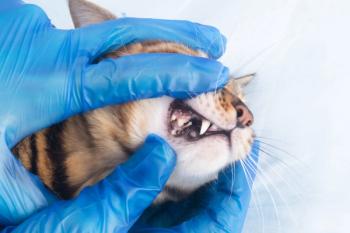
Just Ask the Expert: Take-home pain control measures in cats
Veterinary internist Dr. Laura Smallwood reviews the choices for pain medication to send home with cat owners.
Dr. Smallwood welcomes internal medicine questions from veterinarians and veterinary technicians.
What are your choices for pain medication to send home with cat owners?
A. My choice of pain medication depends on the source of the pain and the anticipated duration of treatment.
For cats that have had a diagnostic or surgical procedure and will require pain control during a short recuperative period (usually less than seven days), my first choice is buprenorphine applied to the buccal membrane. I dispense the buprenorphine in single-dose syringes with instructions to store at room temperature and away from light. I typically start with a dose of 0.01 mg/kg given three times a day but will increase the dose to 0.02 mg/kg given three times a day in situations in which the patient's pain is refractory to the lower dose.
Laura J. Smallwood, DVM, DACVIM
For patients with chronic pain (i.e. joint disease, cancer, chronic oral disease), I recommend tramadol hydrochloride or buprenorphine. Tramadol can be administered orally at a dose of 1 to 4 mg/kg twice daily. Tramadol has the advantage of being an oral preparation that is not a controlled drug. However, some cats find the taste unpalatable, and both dysphoria and mydriasis have been reported as side effects in some cats, particularly at higher doses. Buprenorphine can also be used for chronic pain and is a good option in cats that are difficult to medicate or those that do not respond well to tramadol. However, the expense of long-term buprenorphine treatment combined with having to dispense multiple prefilled syringes make it a less desirable option than tramadol.
In feline patients with chronic pain refractory to tramadol or buprenorphine, gabapentin or amantadine hydrochloride are options. The starting dose I use for gabapentin in cats is 3 mg/kg per os administered once daily, but the dose may be increased to 5 to 10 mg/kg twice daily if needed. I avoid the oral solution of gabapentin because this preparation contains xylitol. Amantadine is an antiviral drug that has analgesic properties because of its ability to bind the N-methyl-D-aspartate (NMDA) receptor. The dose for amantadine in cats is 3 mg/kg per os administered once daily. Experience with amantadine is limited, and toxicoses have been reported in people with relatively small overdoses. For these reasons, I would only use amantadine in situations in which all other pain control therapies have failed. Both gabapentin and amantadine may provide insufficient pain control to be used as sole therapies and should be used in addition to other pain control drugs.
In the past, I have used meloxicam (Metacam—Boehringer Ingelheim Vetmedica) to manage both acute and chronic pain in cats. However, with the recent FDA warning against the repeated use of Metacam in cats, the liability of prescribing this drug for feline patients precludes its repeated use. There are, however, excellent International Society of Feline Medicine and American Association of Feline Practitioners consensus guidelines on the long-term use of nonsteroidal anti-inflammatory drugs (NSAIDs) in cats, should the status of this drug change in the future.
SUGGESTED READING
1. American Animal Hospital Association, American Association of Feline Practitioners, et al. AAHA/AAFP pain management guidelines for dogs and cats. J Am Anim Hosp Assoc 2007;43(5):235-248. Available at:
2. Sparkes AH, Heiene R, Lascelles BD, et al. ISFM and AAFP consensus guidelines: long-term use of NSAIDs in cats. J Feline Med Surg 2010;12(7):521-538. Available at:
Laura J. Smallwood, DVM, DACVIM
Saint Francis Veterinary Specialists
625 Dekalb Industrial Way, Suite 500
Decatur, GA 30033
Newsletter
From exam room tips to practice management insights, get trusted veterinary news delivered straight to your inbox—subscribe to dvm360.





